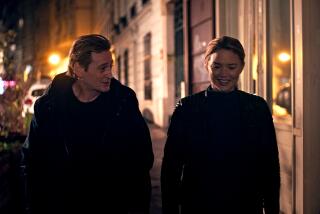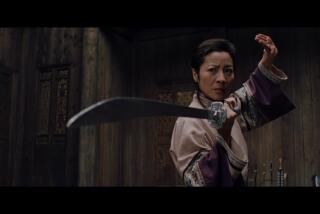‘Vive l’Amour’ a Picture of Loneliness, Longing
- Share via
Writer-director Tsai Ming-liang made his 1992 feature debut with “Rebels of the Neon God,” one of the most powerful Taiwanese films of recent years. His second feature, the 1994 “Vive l’Amour,” opens a regular run today at the Music Hall, fulfilling the promise of the earlier picture.
In “Rebels,” the Malaysia-born Tsai took us into the bored, restless lives of four young people, allowing us to experience their overwhelming sense of futility and increasingly reckless behavior in an utterly soulless Taipei. With “Vive l’Amour,” a bitterly ironic title if ever there was one, Taipei is if anything even more soulless--an urban world as antiseptic, brand-new and relentlessly impersonal as the Paris of Jacques Tati’s classic “Playtime.”
This time Tsai’s people are perhaps a little older and more financially secure, but of the three, two are increasingly desperate in their craving for love.
The film opens with the turning of a key, obtained by a shy young gay man, Ah-jung (Chen Chao-jung), to a spacious high-rise apartment, unfurnished except for a bed. For Ah-jung, the space becomes a refuge from a cold world, a place where he can daydream and indulge in sexual fantasy. For May (Yang Kuei-mei), the chic, thirtysomething real estate broker trying to sell it, the apartment is a place to take men for sex that her pride keeps from allowing to become more than casual. She has in fact just lassoed Hsiao-kang (Lee Kang-sheng), a handsome, confident young man with an occasional radiant smile.
Tsai takes what could be the ingredients for another “Maybe . . . Maybe Not” and creates a portrait of much formal beauty and austerity of human loneliness and longing so somber as to be demanding in the utmost. (Comparisons with Antonioni come to mind.) It unfolds, unaccompanied by music, as one superbly composed image of human isolation after another. Yet the often near-wordless “Vive l’Amour” is worth the not inconsiderable effort because it is an instance of an exceedingly bleak buildup, spiked by occasional dark humor, that actually pays off.
The sterile Taipei of “Vive l’Amour” is so deliberately generic that it could be taking place in the heart of most any modern metropolis, yet there is much that is specific to Taiwan in its three characters’ occupations. That Ah-jung is a salesman for a columbarium calls attention to the fact that Taiwan’s graveyards are filled to capacity. The film’s apartment is one of the countless empty residential and commercial spaces in Taipei, which has one of the highest ratios of unoccupied buildings in the industrialized world in the wake of an ‘80s economic boom. And Hsiao-kang is one of the countless young men who make their living selling upscale clothing (purchased wholesale in Hong Kong) in one of Taipei’s nighttime marketplaces.
Hsiao-kang is in fact the film’s key figure. The other two may despair, but he’s one of those types who live for the moment, easy-going, enjoying May sexually but possessing no apparent emotional needs whatsoever. Hsiao-kang is scary because in him we may be perceiving the future.
* Unrated. Times guidelines: It includes discreet scenes of sex, some nudity.
(BEGIN TEXT OF INFOBOX / INFOGRAPHIC)
‘Vive l’Amour’ (‘Aiqing Wansu’)
Yang Kuei-mei: May
Chen Chao-jung: Ah-jung
Lee Kang-sheng: Hsiao-kang
A Strand Releasing presentation of a Central Motion Pictures Corp. production. Writer-director Tsai Ming-liang. Producer Hsu Li-kong. Executive producer Jiang Feng-chyi. Cinematographer Liao Pen-jung. Editor Sung Shin-cheng. Art director Lee Pao-ling. In Mandarin, with English subtitles. Running time: 1 hour, 58 minutes.
* Exclusively at the Music Hall, 9036 Wilshire Blvd., Beverly Hills, (310) 274-6869.
More to Read
Only good movies
Get the Indie Focus newsletter, Mark Olsen's weekly guide to the world of cinema.
You may occasionally receive promotional content from the Los Angeles Times.










